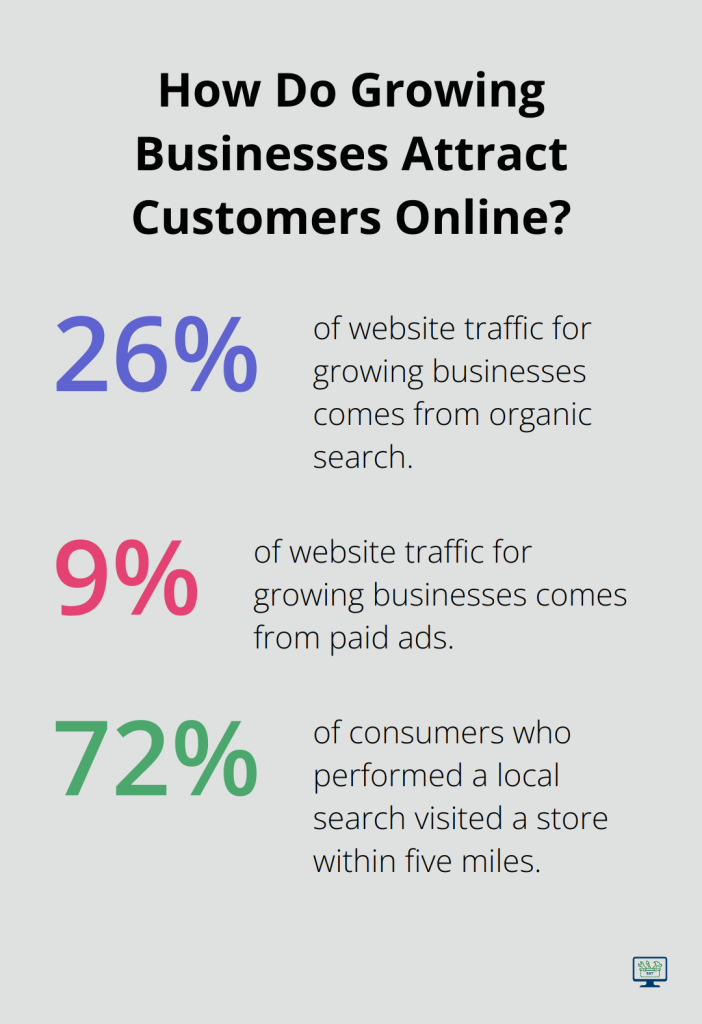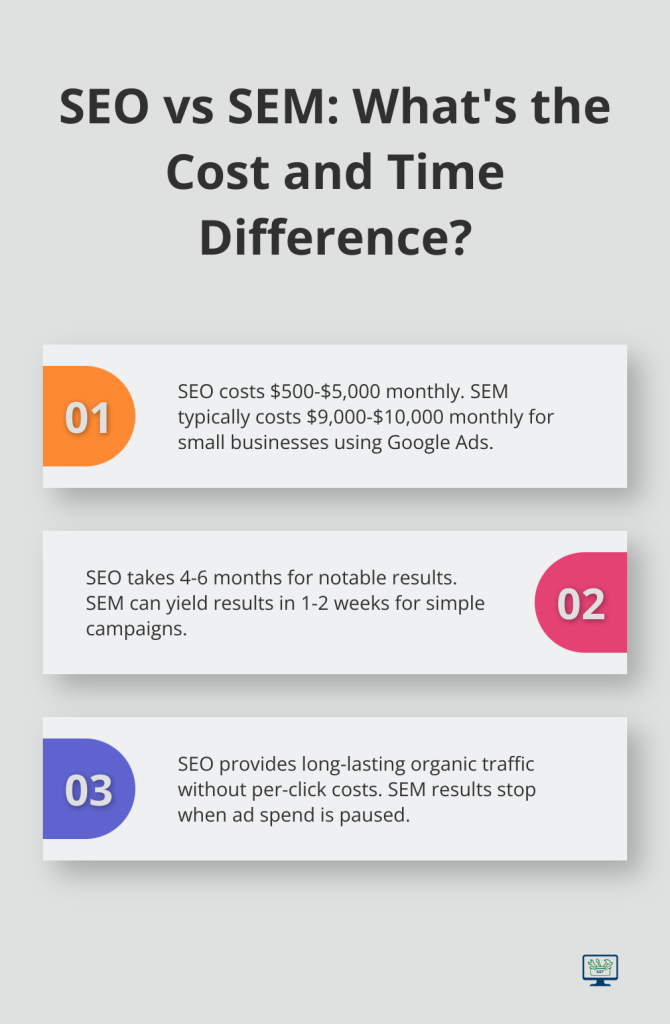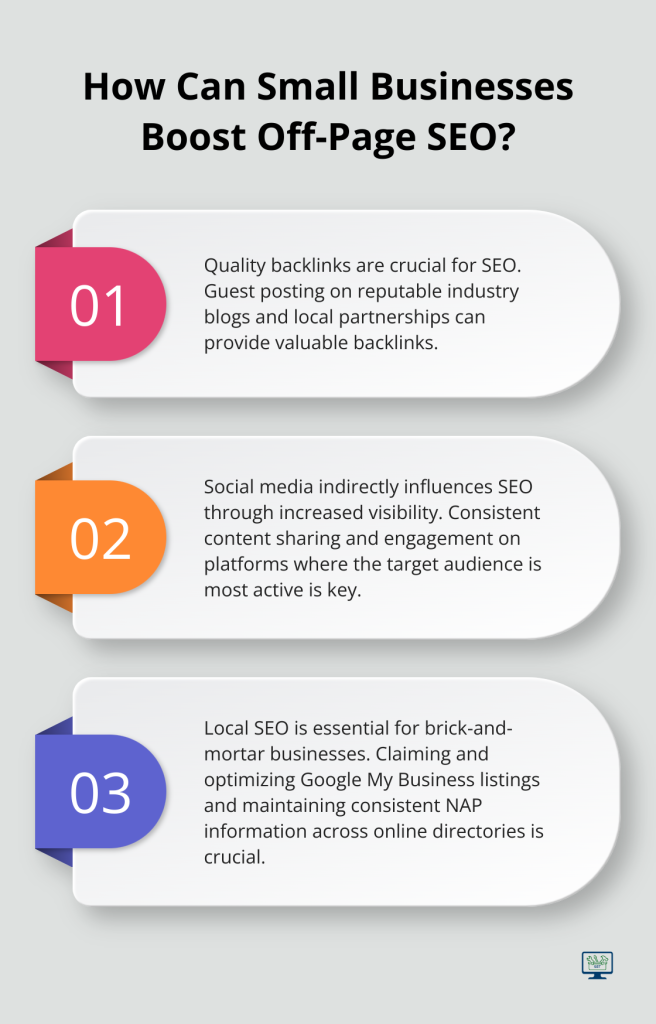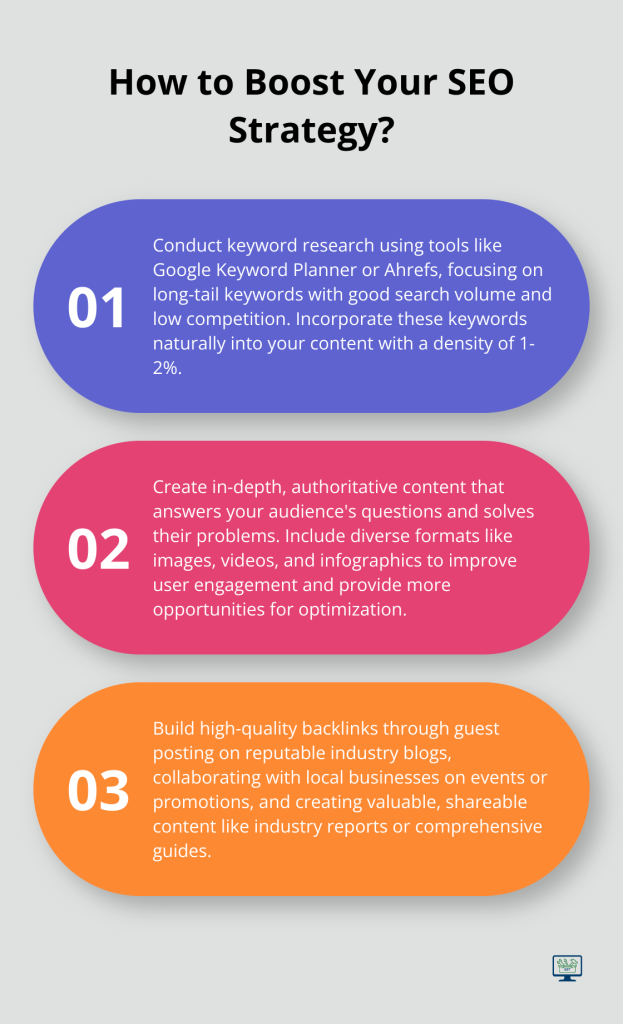SEO marketing for small businesses is a game-changer in today’s digital landscape. At SmallBizToolbox, we’ve seen countless entrepreneurs transform their online presence and skyrocket their growth through effective SEO strategies.
In this post, we’ll share practical tips and techniques to help you harness the power of search engine optimization for your small business. Get ready to boost your visibility, attract more customers, and outrank your competitors.
Why SEO Matters for Small Businesses
The Power of Organic Search
SEO is the secret weapon that levels the playing field for small businesses. It’s not just about ranking high on Google; it’s about connecting with your target audience when they actively search for your products or services.
Organic search drives 26% of website traffic for growing businesses, compared to just 9% from paid ads. For small businesses, this presents a huge opportunity to attract customers without spending a fortune on ads.
SEO’s Three-Pronged Approach
SEO combines strategies that work together to boost your online visibility:
- On-page SEO: Optimizes your website’s content and structure
- Off-page SEO: Builds your site’s authority through backlinks and online mentions
- Technical SEO: Ensures your site is fast, secure, and mobile-friendly

Each component plays a vital role in your overall SEO success. Neglecting any one of them can hold back your entire strategy.
Real Results for Small Businesses
The impact of SEO on small businesses can be dramatic. A BrightLocal study found that 72% of consumers who performed a local search visited a store within five miles. This shows the direct link between SEO and foot traffic for brick-and-mortar businesses.
For online businesses, the benefits are equally impressive. Small businesses that invest in SEO see an average return on investment of 400% within two years (according to a Telapost report).
Starting Your SEO Journey
While SEO can seem complex, the basics are accessible to any small business owner. Focus on creating high-quality, relevant content that answers your customers’ questions. Use tools like Google’s Keyword Planner to find terms your audience searches for, and incorporate them naturally into your website’s content.
SEO is a long-term strategy. It typically takes 6-12 months to see significant results, but the payoff is worth the wait. Unlike paid advertising (which stops working the moment you stop paying), SEO continues to drive traffic and leads long after you’ve put in the initial work.
The Road to Sustainable Growth
Investing in SEO doesn’t just improve your search rankings; it builds a sustainable foundation for your business’s online presence. This investment pays dividends in increased visibility, credibility, and ultimately, revenue.
Now that you understand why SEO matters, let’s explore the essential on-page techniques that will set your small business up for success in search engines.
How to Master On-Page SEO
Keyword Research: The Foundation of SEO
On-page SEO forms the bedrock of any successful search engine optimization strategy. It involves optimizing your website’s content and structure to appeal to both search engines and users. Effective keyword research stands as the cornerstone of on-page SEO success. Start by listing topics relevant to your business, then use tools like Google Keyword Planner or Ahrefs to identify related keywords with good search volume and low competition. Focus on long-tail keywords – they often prove easier to rank for and boast higher conversion rates. For instance, instead of targeting “bakery,” try “gluten-free bakery in Sydney.”

After you identify your target keywords, incorporate them naturally into your content. Try to achieve a keyword density of 1-2% (any more might appear as keyword stuffing to search engines). Place your primary keyword in the first 100 words of your content, and use variations throughout the text.
Content Creation: Providing Value to Your Audience
High-quality, relevant content sits at the heart of on-page SEO. Search engines favor websites that offer valuable information to users. Create in-depth, authoritative content that answers your audience’s questions and solves their problems.
Google’s top search results tend to have longer content. While longer content isn’t always superior, it does provide more opportunities to cover a topic thoroughly and include relevant keywords.
Diversify your content formats to maintain interest. Include images, videos, and infographics alongside your text. This approach not only improves user engagement but also presents more opportunities for optimization through alt tags and file names.
Optimizing Page Elements
Meta titles and descriptions serve as your website’s first impression in search results. Craft compelling titles (under 60 characters) that include your target keyword and clearly describe the page content. Meta descriptions should remain under 160 characters and provide a concise summary of what users can expect.
Headers (H1, H2, H3) help structure your content and enhance readability for both users and search engines. Include your target keyword in your H1 tag, and use related keywords in subheadings. This practice helps search engines understand the hierarchy and relevance of your content.
Website Structure and Internal Linking
A well-structured website facilitates easier crawling and indexing by search engines. Use a logical hierarchy for your site navigation, with important pages no more than three clicks from the homepage.
Internal linking serves as a powerful (yet often overlooked) on-page SEO technique. It helps enhance user experience, improve engagement metrics, and drive users to related content. When linking, use descriptive anchor text that includes relevant keywords, rather than generic phrases like “click here.”
The implementation of these on-page SEO techniques will create a solid foundation for your website’s search engine performance. SEO requires ongoing effort – regularly review and update your content to maintain freshness and relevance. With consistent work, your small business website will climb the search rankings and attract more qualified leads. Now, let’s explore off-page SEO strategies that will further boost your online visibility and authority.
How Small Businesses Can Boost Their Off-Page SEO
Off-page SEO plays a vital role for small businesses aiming to improve their online visibility and authority. While on-page optimization sets the foundation, off-page strategies cement your position in search rankings and build credibility with your audience.
Quality Backlink Building
Quality backlink building remains a key factor in search engine algorithms. Small businesses should focus on earning high-quality backlinks through valuable, shareable content. This could include industry reports, infographics, or comprehensive guides.

Guest posting on reputable industry blogs offers another effective tactic. Small business owners should reach out to relevant websites and offer to contribute their expertise. This not only earns a backlink but also exposes the brand to a new audience.
Local partnerships provide a goldmine for backlinks. Small businesses can collaborate with other local businesses on events or promotions, and request a mention on their website.
Social Media for SEO Benefits
While social media signals don’t directly impact rankings, they indirectly influence SEO. Active social media profiles increase brand visibility and drive traffic to websites. This increased engagement can lead to more backlinks and improved search rankings.
Small businesses should focus on platforms where their target audience is most active. Consistent content sharing and follower engagement are key. Encouraging user-generated content through contests or customer story features not only boosts engagement but also creates fresh content for the brand.
Local SEO Domination
For brick-and-mortar businesses, local SEO is essential. The first step involves claiming and optimizing the Google My Business listing. Businesses must ensure their NAP (Name, Address, Phone number) information remains consistent across all online directories.
Customer reviews play a significant role in local SEO. Small businesses should encourage customers to leave reviews on Google and other relevant platforms. Prompt and professional responses to all reviews, both positive and negative, demonstrate value for customer feedback.
Creating location-specific content on the website can boost local SEO. This might include blog posts about local events or pages dedicated to each service area. Using location-based keywords naturally in the content improves visibility in local searches.
Online Reputation Management
A business’s online reputation directly impacts its SEO efforts. Small businesses should monitor brand mentions across the web using tools like Google Alerts or Mention. Addressing negative comments or reviews promptly and professionally is essential.
Actively seeking positive reviews from satisfied customers can enhance online reputation. Small businesses might consider implementing a follow-up email system that asks for feedback after a purchase or service. Making it easy for happy customers to share their experiences on review platforms can significantly boost the business’s online reputation.
Showcasing expertise by participating in industry forums or answering questions on platforms like Quora not only builds reputation but can also drive traffic back to the website.
Final Thoughts
SEO marketing for small businesses transforms online presence and drives sustainable growth. We recommend you create high-quality content, conduct thorough keyword research, and optimize your website structure. Build quality backlinks through valuable content and strategic partnerships, and don’t overlook the power of local SEO for brick-and-mortar businesses.

Tools like Google Analytics, Google Search Console, and keyword research platforms provide valuable insights into your website’s performance. SmallBizToolbox offers AI-driven content creation tools, SEO optimization features, and expert insights to support your SEO strategy. These resources help you identify areas for improvement and take your SEO efforts to new heights.
SEO results take time, but consistent application of best practices will yield long-term benefits for your small business. You should regularly analyze your performance and adapt as search engine algorithms evolve. With dedication and the right tools, your small business can achieve remarkable visibility and success in the digital landscape.
How useful was this Resource?
Click on a star to rate it!
Average rating 0 / 5. Vote count: 0
No votes so far! Be the first to rate this post.
We are sorry that this post was not useful for you!
Let us improve this Resource!
Tell us how we can improve this Resource?




